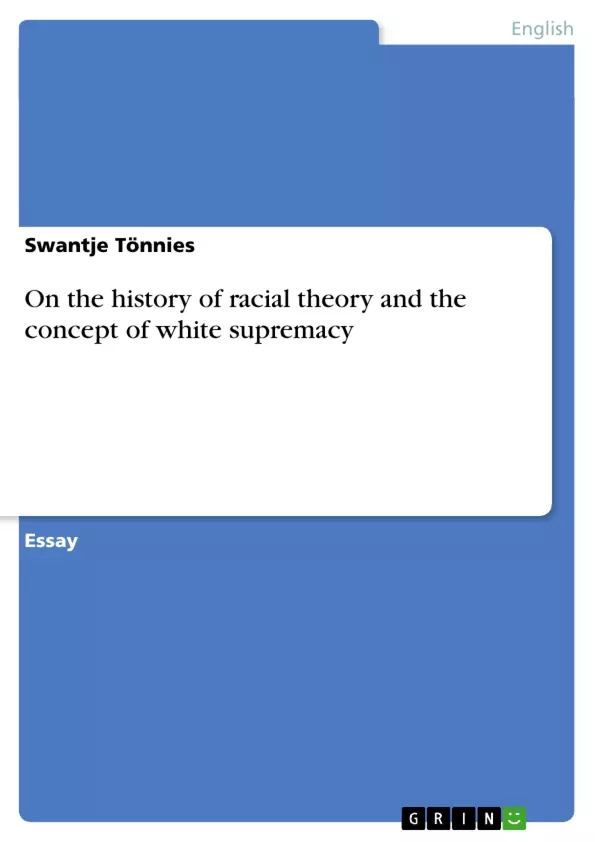Although historians have not been able to pin down when and where exactly the concept of white supremacy first emerged, the human urge to classify living organisms according to a hierarchical system - from which the idea of supremcy has sprung - is ancient. It is common to several religions and socio-political concepts, yet what is most relevant when looking at the supression and subjugation of indigenous peoples under the hands of white man, are its deep roots within Christian nations, especially in the Middle Ages. The ‘divine mission’ to spread ‘civilisation and belief’ was repeatedly used as a pretext for exploitative colonialism, as in the example of the conquest of South America by the Spanish. Centuries later in what is called the Enlightenment period, theories of special creation were abandoned and evolutionary theories gave rise to more concrete ideas about racial superiority of whites, who in this way tried to justify their imperialist motives. At the turn of the 19th century, the industrial European nations were grabbing for colonies, eventually ending up in battle fighting for their share of Africa. Thus, racial theory and white supremacy have been closely related with ultra-capitalilsm.
Inhaltsverzeichnis (Table of Contents)
- Introduction
- Racial Classification in the European Enlightenment
- The Great Chain of Being
- Monogenetic and Polygenetic Theories
- Blumenbach and the “Caucasian” Race
- Morton and Polygenesis
- Linnaeus and the Khoi
- Evolutionary Theory and Its Interpretations
- Darwin’s Theory of Evolution
- Knox’s The Races of Men
- White Supremacy, Imperialism and Genocide
Zielsetzung und Themenschwerpunkte (Objectives and Key Themes)
This text explores the historical development of racial theory and the concept of white supremacy. It traces the roots of these ideas from ancient classifications of living organisms to their role in shaping European colonialism and imperialism.
- The evolution of racial classification systems from ancient hierarchies to modern scientific theories
- The influence of Christian theology and Enlightenment rationalism on the development of racial thought
- The relationship between racial theory, white supremacy, and imperialism
- The role of evolutionary theory in justifying racial hierarchies
- The impact of racial theory on the treatment of indigenous peoples and the rise of genocide
Zusammenfassung der Kapitel (Chapter Summaries)
- Introduction: The introduction discusses the ancient origins of hierarchical classifications of living organisms and their connection to the development of white supremacy. It highlights the role of Christian theology and colonialism in perpetuating these ideas, leading into the Enlightenment period.
- Racial Classification in the European Enlightenment: This chapter examines the impact of the Enlightenment on racial classification, focusing on the "Great Chain of Being" and the rise of both monogenetic and polygenetic theories. It discusses the views of Blumenbach and Morton, as well as Linnaeus' contributions to the classification of the Khoi.
- Evolutionary Theory and Its Interpretations: This chapter explores how Darwin's theory of evolution influenced the development of racial theory. It analyzes Darwin's concept of natural selection and its application to human races, as well as the idea of the "missing link" and the continuation of Linnaeus' work in Knox's The Races of Men.
- White Supremacy, Imperialism and Genocide: This chapter examines the relationship between white supremacy, imperialism, and genocide. It explores the impact of nationalist, Aryanist, and anti-pacifist ideas in the 20th century and the use of racial theory to justify colonial expansion and oppression.
Schlüsselwörter (Keywords)
This text centers around the key concepts of racial theory, white supremacy, colonialism, imperialism, and genocide. It examines the historical development of these ideas, exploring their philosophical, religious, and scientific underpinnings. Key figures discussed include Blumenbach, Morton, Linnaeus, Darwin, and Knox. The text also explores the role of the Enlightenment, evolutionary theory, and the "Great Chain of Being" in shaping racial thought.
Frequently Asked Questions
What are the historical roots of white supremacy?
The concept has roots in ancient hierarchical classification systems and was later reinforced by Christian nations during the Middle Ages to justify colonialism.
How did the Enlightenment influence racial theory?
During the Enlightenment, theories like the "Great Chain of Being" and monogenetic/polygenetic ideas emerged to scientifically classify human races into hierarchies.
Who was Blumenbach and why is he significant?
Johann Friedrich Blumenbach is known for establishing racial categories, including the term "Caucasian," which influenced modern racial thought.
What role did Darwinism play in racial superiority theories?
Darwin's theory of evolution was often misinterpreted or applied to human societies to justify the idea of racial superiority and imperialist motives.
How is racial theory linked to ultra-capitalism?
Racial theories provided a justification for European nations to grab colonies in Africa and elsewhere to fuel their industrial and capitalist expansion.
- Quote paper
- Swantje Tönnies (Author), 2006, On the history of racial theory and the concept of white supremacy, Munich, GRIN Verlag, https://www.grin.com/document/92536



